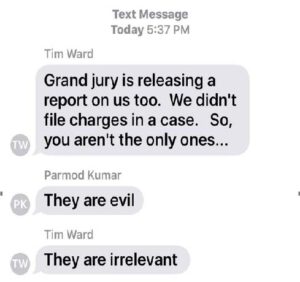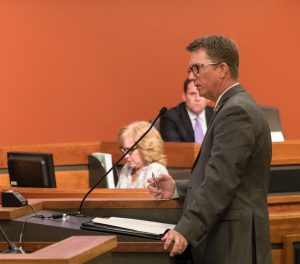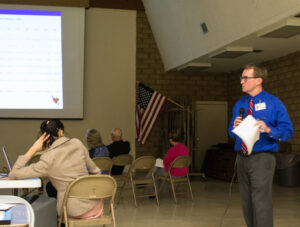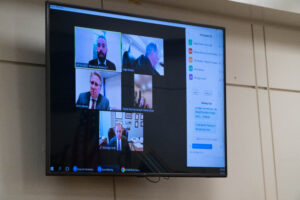The Tulare County District Attorney’s office has responded to allegations made by Healthcare Conglomerate Associates (HCCA) CEO Yorai “Benny” Benzeevi that his prosecution is due to political pressure against – and bias by – Tulare County District Attorney Tim Ward.
The California Attorney General’s office backed up Ward’s office with a separate filing and the overarching response from both entities is: Ward wasn’t friends with Benzeevi, he didn’t file charges against Benzeevi in a bid to secure re-election and he never asked Benzeevi to help him move to a new home.
 In December, Benzeevi’s attorney – former US District Attorney McGregor Scott – was joined by attorneys for former HCCA CFO Alan Germany and Baker Hostetler lawyer Bruce Greene in filing a lengthy motion that alleged Ward only took an interest in the trio’s work at Tulare Regional Medical Center as a bid to win his re-election – and that Benzeevi and Ward were close friends until Benzeevi became politically toxic in Tulare.
In December, Benzeevi’s attorney – former US District Attorney McGregor Scott – was joined by attorneys for former HCCA CFO Alan Germany and Baker Hostetler lawyer Bruce Greene in filing a lengthy motion that alleged Ward only took an interest in the trio’s work at Tulare Regional Medical Center as a bid to win his re-election – and that Benzeevi and Ward were close friends until Benzeevi became politically toxic in Tulare.
To bolster his allegations, Benzeevi’s attorney included photos of Benzeevi and Ward at public events, quoted articles written by the Visalia Times Delta and Valley Voice, and included an embarrassing text message in which Ward appears to demean the Tulare County Grand Jury as “irrelevant” after the release of its “Tower of Shame” report.
Benzeevi’s company managed Tulare Regional Medical Center from 2014 to 2017; HCCA also managed the Southern Inyo Hospital from 2016 to 2017. Germany oversaw the finances of both hospitals, while Greene and the Baker firm represented HCCA, Benzeevi and the Tulare Local Healthcare District simultaneously.
The three men were charged with crimes surrounding their time running Tulare Regional Medical Center – including allegedly commingling funds and equipment between Tulare and Southern Inyo – that could land Benzeevi up to 40 years in prison, and land Greene and Germany up to 10 years each.
Ward’s office’s response

“[The defense] has no actual compelling evidence. They rely on hearsay, inuendo [sic], and their own fevered imaginations to weave a fable that Dr. Benzeevi and D.A. Ward were close friends, and that because for a [sic] small group of people in Tulare were upset with Dr. Benzeevi, D.A. Ward immediately launched a political persecution of Dr. Benzeevi,” the filing by the district attorney’s office reads.
“Why submit a text that is so obviously inadmissible? Most obviously, they attempt to submit this because they have nothing else. The primary objective is merely to smear D.A. Ward, as the content of the text is a comment that the public is likely to find imprudent,” the filing reads. “The text is wildly inadmissible, does not support the idea that there was any discussion of the illegal acts of Dr. Benzeevi, and is not a part of direct communication between D.A. Ward and Dr. Benzeevi. The only purpose here is an attempt to smear the reputation of D.A. Ward and the Office of the Tulare County District Attorney (TCDA hereafter), which is a noticeable theme throughout the defense motion.”
“This is nonsense. Dr. Benzeevi committed serious crimes, which are well established by the evidence in this case. The Tulare County District Attorney’s Office did their duty and investigated the allegations of criminal activity and upon finding evidence beyond a reasonable doubt, filed the appropriate charges,” it continues.
The true objective of the defense, the district attorney’s filing claims, is to embarrass Ward and muddy the waters – citing the grand jury text message as proof. The “Tower of Shame” report had nothing to do with Benzeevi’s case, the filing states, and the text message was likely forwarded to Benzeevi by another party, since only Ward and Dr. Parmod Kumar’s names appear in the screenshot.
The only relationship that existed between Benzeevi and Ward was “that of a campaign donor and professional acquaintance,” the filing claims.
As a rebuttal to Benzeevi’s allegations, Ward’s office cites a declaration by Evette Bakke, a professional campaign manager for multiple candidates, including Ward. Bakke states that Ward had “low name recognition” in 2014 even though Ward had been the acting DA for two years. She first reached out to Benzeevi for donations as part of a strategy for him to “talk to everyone he could.”
“It is common for candidates running for elected office to have coffee and meals with donors,” Bakke states in her declaration, later stating that it is “important for a candidate for local office to appear at and be involved in large community events sponsored by business and organizations when they are running for office,” presumably referring to a photo of Ward and Benzeevi together at a community event.”
Ward’s office tackles, point-by-point, the other claims Benzeevi’s attorneys made.
Claims that Ward asked Benzeevi for help moving are “simply not credible,” the filing claims, adding that Benzeevi did not state “whether this was a joke or something to be taken seriously,” and that Ward hired professional movers.
While Ward concedes that he invited HCCA officials for training at the Tulare County District Attorney’s office, the “featured presenter” was Tony Jones, a hospital turnaround expert hired by HCCA – not Benzeevi himself.
“As we were inviting Mr. Jones, professional courtesy dictated we invite Dr. Benzeevi as well,” Ward states in a declaration.
Denying allegations of political warrants and intervention

Benzeevi and his co-defendants claim that Ward began intervening in the turmoil surrounding Tulare Regional Medical Center as a political ploy. Ward’s office says that’s false, and that there’s no evidence he was concerned about the issue in the political arena.
“In a county of almost 500,000 people, a small portion of the population was concerned about issues involving HCCA,” the filing reads. “Mrs. Bakke advised D.A. Ward to not focus on the issue, as only a small portion of the county’s population resides in Tulare.”
Ward’s office also rejected claims that the Southern Inyo Hospital was searched as a result of his 2018 challenger Matt Darby entering the race and lambasting him for a perceived lack of action against HCCA.
The Voice published an article on October 18, 2017 revealing that Ward’s office searched the Southern Inyo Hospital looking for property taken from Tulare Regional. The next day, Darby entered the race.
The warrant for that search was drawn up and approved on October 13, 2017. Without the benefit of clairvoyance, Ward’s office says it is “obvious” that “a search warrant drawn up on the 13th cannot be in response to the candidate announcing his candidacy on the 19th.”
Benzeevi’s team also claimed that the district attorney’s office purposefully served a search warrant at his home on his daughter’s 18th birthday, April 4, 2018.
In an affidavit, Rodney Klassen – an investigator with the Tulare County District Attorney’s Office at the time the warrants were served – said the warrant was served at the best possible time, without the knowledge of his daughter’s date of birth: Benzeevi had to be home when the warrant was served to prevent evidence destruction, and the warrant had to be served within 10 days of its approval on April 2, 2018.
“It was critical to the investigation for Dr. Benzeevi to be at his residence when the search warrant was served because included in the search warrant were Dr. Benzeevi’s laptop computer and cellphone. I wanted to collect those items while at his residence to avoid the possibility of evidence being destroyed,” Klassen states. “In the weeks leading up to the search warrant service I observed Dr. Benzeevi on one occasion when he was leaving his residence. The next time I saw Dr. Benzeevi is when he returned home on the day the search warrant was served.”
Klassen claims that information from Enterprise Rent-A-Car showed Benzeevi would regularly rent different cars at Los Angeles International Airport, which “made it so [Klassen] would not recognize Dr. Benzeevi being at home unless I saw him there.”
Attorney General’s office steps in

Heather S. Gimle, a deputy attorney general, wrote on behalf of the state Attorney General’s office.
Gimle worked on other recusal cases across the state, including a 2016 Tulare County case in which Christopher Cheary, a man accused of sexually abusing and murdering his girlfriend’s three-year-old daughter, argued that Ward’s office was biased after taking part in a ceremony to dedicate a bench in memory of the child and other abused children.
The judge in that case ruled there was no conflict; Cheary would later be convicted and sentenced to death.
In the Cheary case Gimie argued against recusing Ward, as she does in this case.
The law requires “more than an appearance of impropriety,” she stated in her filing, and that “not all conflicts are created equally, rather, they exist on a spectrum.”
“Some are on the harmless end of the spectrum, and thus not disabling, while others are on the more serious end of the spectrum, and thus endanger a defendant’s right to a fair trial,” Gimle wrote.
Gimle argued that no conflicts exist, but even if they did, they must be considered severe enough to warrant the removal of Ward’s office.
“The district attorney will inevitably meet and know countless people based not only on his position, but simply living in a community, and that alone cannot create a conflict. Thus, the fact that the District Attorney Ward and defendant Benzeevi had a relationship does not create a reasonable inference that the district attorney’s office would treat the defendant unfairly,” Gimle added. “This is especially true in light of the fact that they had an amicable relationship. However, even in cases where the relationship at issue could be construed as antagonistic between the prosecutor and the defendant, courts have not required removal.”
Other recusal cases
She cites Millsap v. Superior Court, in which a defendant was charged with 27 felony counts, two of which were for soliciting the murder of the prosecuting attorneys working the case. An appellate court denied the attempt to recuse the entire district attorney’s office in that case, instead requiring that the two would need to recuse themselves from only those two counts.
“Were it possible for a defendant charged with serious crimes to disqualify the prosecutors trying the case from proceeding with the prosecution by threatening them, willful defendants would be handed a powerful weapon to disrupt the course of justice,” the judge wrote in that case.
Gimle applies that same logic to this case, stating that while there was no evidence Benzeevi donated to Ward’s campaign in anticipation of potential charges, “if a defendant could recuse an entire district attorney’s office by donating to a political campaign,” it would similarly provide a “powerful weapon to disrupt the course of justice.”
She cites other cases to make the same point: People v. Neely, in which an El Dorado County prosecutor, Gary Lacy, ran against the sitting district attorney and criticized him for not seeking the death penalty against the defendant. The sitting district attorney lost his re-election bid, and assigned the case to Lacy, his soon-to-be successor. Lacy then offered the defendant a plea bargain of life without death; the judge hearing the initial case stated that even though Lacy had apparently looked at the case even-handedly, “the appearance problem [was] more important.”
The judge ruled to recuse the El Dorado County District Attorney’s office based on the potential appearance to the public, but an appellate court stated that focusing on “how the public might view the matter” would be “contrary to law.”
Other issues raised – such as prosecutors retrieving and filing copies of Benzeevi’s tax returns with the court and statements given to the Tulare Local Healthcare District board and the Tulare County Board of Supervisors – are “issues that come up in cases and could be litigated and, if necessary, resolved by other remedies,” Gimle wrote.
Gimle also wrote to rebut statements in the trio’s December filing that two other cases, Schumb and Lastra, are similar: judges in those cases found that recusal was necessary.
In Lastra, the defendants were charged after participating in a Black Lives Matter protest following the murder of George Floyd in July 2020. They moved to disqualify the San Luis Obispo County District Attorney’s Office, claiming district attorney Dan Dow was “aligned with right-wing conservative political organizations and fundamentalist religious groups” that vilified the Black Lives Matter movement. In October 2020, Dow appeared with conservative commentator Candace Owens calling Black Lives Matter “one of the most racist movements that ever existed in this country.”
A judge granted the recusal motion in that case, and an appellate court upheld the recusal.
Gimle wrote that the facts in the San Luis Obispo County case aren’t the same as the facts in the Benzeevi case: Dow was a member of conservative circles and spoke against the Black Lives Matter movement, but Ward wasn’t a member of Citizens for Hospital Accountability, the main group formed to counter HCCA and Benzeevi’s management of Tulare Regional. Dow fundraised on countering “wacky defund the police movement[s],” but Ward did not fundraise off of the Benzeevi case.
In Schumb, the Santa Clara District Attorney’s office charged Christopher Schumb as a co-conspirator in a quid pro quo scheme in which the Santa Clara County Sheriff’s Department allegedly issued permits to carry concealed weapons in exchange for donations to the sheriff’s re-election campaign. Schumb was a friend of Santa Clara District Attorney Jeff Rosen and Rosen’s chief assistant, Jay Boyarsky; he told the court that Boyarsky had even called on him to mediate a dispute with the sheriff.
Schumb handled the fundraising for the sheriff’s campaign, putting him in the center of the quid pro quo allegations. He filed for recusal, stating that his close relationship with leaders at the Santa Clara DA’s office meant he was unlikely to receive a fair trial.
The Schumb case is different, Gimle wrote, because all parties admitted they were friends, and Schumb was called upon by the DA’s office as a mediator between Rosen’s office and the Santa Clara sheriff.
“Any number of people make political donations, like defendant Benzeevi did in this case. On the other hand, in Shumb [sic], the defendant was not a mere political donor, rather he was involved in illegal activity while raising money for the sheriff’s political campaign, and he had also raised money for the district attorney. The taint between that association was much closer to home for Rosen and potentially politically harmful,” Gimle’s filing reads.
“In this matter, the combination of facts that concerned the Court of Appeal do not exist. Defendant Benzeevi was certainly a political donor, but he was not a friend of the district attorney. However, even assuming he was a friend, it was not a close friendship where defendant Benzeevi provided professional advice to the district attorney, as the defendant did in Schumb,” she continues. “The other facts that combined to create a disabling conflict in Schumb are also missing here. District Attorney Ward is not a witness in the case. Nor is the chief assistant. The facts of the case do not involve, or are not connected to, the district attorney, or political donations that defendant Benzeevi made, nor do they involved [sic] someone that the district attorney has a professional relationship with, like the sheriff in Schumb.”
Stay in the loop
The next hearing in this case is slated for March 13 at a location to be determined. The Voice will cover this story as it continues.


The A.G. 100% ALWAYS argues that there is no DA conflict and that the DA should be not be recused whether there is an actual conflict or not. Otherwise, the A.G. would have to take over this case, and they certainly don’t want that. With inexperienced milquetoast and uber leftist Rob Bonta at the helm of the A.G.’s office, the A.G. would just dismiss the case even if they did end up with it.
100% biased assessment of the A.G. How sad and pathetic to view everything from a personal political prism. Inexperienced milquetoast and uber leftist? How much experienced do YOU have Mr. or Ms. “In the Know” as an Attorney General in the State of California or for any State for that matter? So you come from a legal/judicial background? Have you ever met the A.G. in person and had a one-on-one talk with him on any type of matter? Or is your only connection with the A.G. from listening to right-wing political talk shows on the radio or T.V.? Why is it necessary to politicize everything and everyone? Surely you weren’t born with that type of mindset !?!?!
Tulare Citizen, how do you think Rob Bonta got his job? Politics. How else would any human being on earth be able to be appointed as the head of a state law enforcement agency with literally ZERO experience as a prosecutor and having never even worked a day in his life at said agency? That’s politics for you, and to answer your question, I have more than quadruple the experience of Rob Bonta and his second in command combined as a state prosecutor. I know many of Bonta’s deputies, and they have zero respect for him and his total lack of experience in any prosecutorial capacity. Now that’s “sad and pathetic”, as you say.
He not a State Senator or State Representative representing the wing of a political party in the State of California. He is the Attorney General of California who advocates and fights for truth and justice for ALL Californians regardless of political parties. Hopefully he’s not another Wm. Barr and makes his judicial decisions based on unbiased facts.
This Tim Ward v. Benny Benzevi thing reminds me of the Iran-Iraq war back in the 80s. There were no “good guys” then and there and there are no “good guys” here and now.
Which rental car company rents you the same car. None, that’s which one.